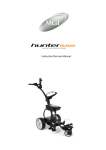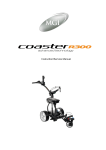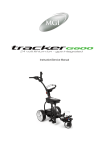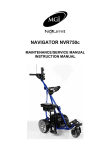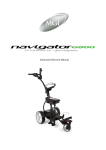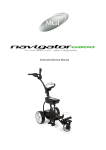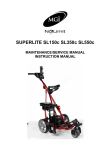Download MGI Ryder R75 Service manual
Transcript
Instruction/Service Manual INDEX MAINTENANCE / SERVICE MANUALPAGE 1. Foreword1 2. Important1 3. Warranty Registration1 4. Warranty Service Problem1 5. Warranty Policy1 6. Warranty Exclusions2 7. Parts Installed During Warranty2 8. Preventative Maintenance Program2 9. Cleaning Your Buggy2 10. Rear Wheel Axles2 11. Clutches3 12. Upper & Lower Bag Straps3 13. Correcting the Alignment of Your Buggy 3 14. MGI Service Schedule4 15. Service Record5 INDEX INSTRUCTION MANUALPAGE 1. Most Important points to read prior to using your buggy 6 2. Charging and care of the Battery 6 3. Fitting the Battery7 4. Battery Lead Fuse7 5. Fail Safe Connection8 6. Attaching / Removing Wheels 8 7. Free Wheeling Gear System8 8. Folding / Unfolding the Buggy 9 9. Fitting your Golf Bag10 10. Assembling the Umbrella Holder 10 11. Operating the Digital Top Box10,11 12. Frequently Asked Questions11 13. Further information12 14. Troubleshooting Guide13 MAINTENANCE SERVICE MANUAL 1. Foreword Congratulations on the purchase of your Ryder R75 buggy. To ensure continued efficiency of your MGI motorised buggy, regular maintenance at periodic intervals is essential. For guidance, this booklet contains a schedule applicable to the maintenance required at the appropriate times and a service record. 2. Important If operating in conditions such as those mentioned below, speed controls, clutches, frame alignment, adjustment, tightening and axle alignment should be serviced at more frequent intervals than specified in this booklet: a. playing more than twice a week b. damp or wet conditions c. rough, dusty or sandy conditions d. hilly conditions 3. Warranty Registration Warranty registration can be made on-line at www.mgi-golf.com Important: To locate your serial number, look underneath the top control box or underneath the battery tray. It will begin with the letters AR. Example: AR1B21104101047 4. Warranty Service Problem Purchase date of the motorised buggy must be given before warranty is accepted for processing. In the event of a need for warranty service, either refer to the list of authorised service centres on our website or email [email protected] 5. Warranty Policy Ryder R75 is covered for a period of 24 months from date of the purchase, MGI or an authorised service centre or person will repair or replace free of charge any parts found to be defective in materials or workmanship under normal use provided that: 1. The Ryder R75 has been properly used, maintained and regularly serviced 2. The replacement or repair is performed by an authorised MGI service centre or the owner with MGI approval. *SLA Battery and Charger are covered by 12 months warranty only 1 6. Warranty Exclusions – the following events will void warranty: a. Any alteration performed by non authorised people or companies. b. Fitting of parts or accessories not recommended by MGI. c. Any damage caused by continued operation of the motorised buggy after it is known to be defective. d. Damaged seat support bracket on buggy chassis All implied warranties [save those preserved by statute] are excluded. Liability for consequential damages under any and all warranties are excluded to the extent exclusion is permitted by law. 7. Parts Installed During Warranty Warranty coverage for components installed during a motorised buggy’s warranty period shall consist of the duration of the buggy’s warranty period, provided the warranty installation is performed by MGI, an authorised service centre or the buggy owner on approval. Replacement of parts under warranty will not extend the warranty of the buggy or parts. 8. Preventative Maintenance Program To properly provide for the continued operation of your motorised buggy, MGI has introduced its Preventative Maintenance Program [PMP]. The PMP consists of work to be carried out by both the owner and authorised service centres. To properly maintain the warranty of your MGI motorised buggy, it is essential that this work is carried out. If the work carried out by the authorised service centre is to replace parts that are part of the maintenance schedule, the owner will be charged for the parts and labour. If the work to be carried out is part of warranty, MGI will bear the cost. 9. Cleaning Your Motorised Buggy [See Maintenance Schedule] For years of good operation, your buggy requires care and attention. Keep your buggy clean by using a cloth with warm water and a mild detergent. Do not hose down your buggy under any circumstance, as your buggy has electronic components. Ensure that the seat stem bracket is free from sand. 10. Rear Wheel Axles [See Maintenance Schedule] The rear wheel stub axles need to be lubricated regularly. Remove the rear wheels by depressing the spring clip and at the same time pull off the wheel. Apply Petroleum Jelly or light grease to the stub axles. Use a very small amount as the grease can attract sand. If you play in sandy conditions you should clean your axle and regrease fortnightly. To refit the rear wheels you will need to align the wheel’s four sided slot to its equivalent on the buggy to ensure the wheels are properly engaged. Ensure that the wheels are put on the correct side ‘L’ and ‘R’. 2 11. Clutches [See Maintenance Schedule] The rear wheel clutches located in the wheel, need to be checked to confirm they function correctly and should be replaced as per the Service Schedule. Try and turn the Right Hand clutch/wheel in an anti clock wise direction – if you cannot it is functioning correctly. Try and turn the Left Hand clutch/wheel in a clock wise direction – if you cannot it is functioning correctly. 12. Upper & Lower Bag Straps [See Maintenance Schedule] The bag straps should be replaced as per the Service Schedule. The upper bag strap can be replaced by: 1. Removing the left and right hand straps form the upper bag support 2. Undo and remove the screws holding the strap in position on the bag support 3. Remove and replace both bag straps 4. Insert bag strap securing screws 13. Correcting the Alignment of your Motorised Buggy If during use, you find that the buggy veers to the right or left, please follow the instructions below to correct this problem: 1. If the buggy veers to the left, face the front wheel of the buggy and use the Allen key provided to screw the right bolt clockwise or the left bolt anti-clockwise. 2. If the buggy veers to the right, face the front wheel of the buggy and use the Allen key provided to screw the left bolt clockwise or the right bolt anti clockwise. Test run the buggy and repeat the process until the buggy runs straight. 3 14. MGI Service Schedule It is the owner’s responsibility to ensure that all periodical checks, necessary adjustments and services are carried out. If in doubt please contact the MGI service centre on 1300 644 523. Any work performed on your buggy should be recorded on your service record (see page 5) regardless of the work. Ryder R75 Monthly Wipe down the buggy with a warm cloth after each use Lubricate rear wheel stub axles BO 6 Monthly Yearly 3 Yearly BO Check rear wheel clutches function correctly Check & tighten nuts & bolts BO Check & tighten handle pivots BO/SC Check alignment of buggy – ensure that it runs straight Replace rear wheel clutches BO /SC BO /SC BO/SC Replace fused battery leads BO/SC Replace speed controller & On/Off switch assembly Replace rear and front wheels BO/SC BO Replace upper & lower bag straps BO Replace handle grips BO/SC BO = Buggy owner can carry out this work SC = Charged work to be carried by approved service centre BO/SC = The six monthly service can be completed by either an authorised service centre or the owner of the buggy. 4 The tools to tighten all nuts and bolts are provided with your maintenance / service and instruction manual. As part of MGI’s Preventative Maintenance Program, if the six monthly services are carried out by an authorised service centre, you will be charged for that service. Each yearly service should also include the six monthly service. It is important for your warranty and the life of your buggy that the service record be observed and maintained. Monthly cleaning and lubrication need not be recorded on the service record. Service Record for All Buggies 6 month inspection Date: Invoice #: Serviced by: Signature: 1 year inspection Date: Invoice #: Serviced by: Signature: 1 ½ year inspection Date: Invoice #: Serviced by: Signature: 2 year inspection Date: Invoice #: Serviced by: Signature: 2 ½ year inspection Date: Invoice #: Serviced by: Signature: 3 year inspection Date: Invoice #: Serviced by: Signature: 3 ½ year inspection Date: Invoice #: Serviced by: Signature: 4 year inspection Date: Invoice #: Serviced by: Signature: 4 ½ year inspection Date: Invoice #: Serviced by: Signature: 5 year inspection Date: Invoice #: Serviced by: Signature: 5 ½ year inspection Date: Invoice #: Serviced by: Signature: 6 year inspection Date: Invoice #: Serviced by: Signature: 5 INSTRUCTION MANUAL 1. Most Important points to read prior to using your buggy - Charge the battery [see below] - Assemble the buggy placing the rear wheels on their correct side [see page 8] 2. Charging and care of the battery The Ryder R75 is designed to take either the standard SLA 21/28 amp/hr battery OR MGI’s Lithium Ion 12 volt battery. The charger should be matched with its respective battery by ensuring the same coloured connector is on the battery. For example the 12v SLA charger with the Red and Black connector and grey outer casing is to be connected to a 12v SLA battery also with a Red and Black connectors. Connect Red to Red and Black to Black. For 12v lithium chargers, connect the blue connecter with blue outer casing to blue connector on the 12 v lithium battery. Do NOT connect unmatched batteries or chargers otherwise the warranty on each item will be void. -Plug the charger into a powerpoint and attach the battery lead to the charger, matching the connections properly. -Always recharge the battery as soon as possible after use, no matter how short the period of use. Your battery will charge best, lying flat, in a warm and air flowing location. Note: In winter, it is best charged off any concrete floor and preferably in a warm location within the house. -During play, minimise the drain on the battery by avoiding taking your buggy into the rough whenever possible. -Avoid as much as possible using the buggy to pull you up the hills -In between use, always leave the charger connected to the battery with power on. -The battery is a sealed battery. If you are intending to take your buggy and battery on air travel, we advise that you make contact with your airline prior to travel. -Be very careful not to drop your battery. The battery casing is easily cracked and the battery’s subsequent life will be severely compromised. 6 LED Indicator -The Red LED illuminates to indicate the charger is power on. -The Yellow LED indicates the battery is charging. -The LED will turn Green when the battery is fully charged. -The LED will flash Green when the battery is on float charge. -The 12v SLA charger will power off automatically after being on float charge for three hours. The 12v lithium ion charger will power off automatically after being on float charge for 18 hours. 3. Fitting the battery Once charged, the battery can be fitted to the buggy. The battery comes with a battery cover, carry handle and battery leads. a. Place your battery in the tray with the leads facing to the front of the buggy. b. Ensure the white dots on fused battery lead connection are aligned with the battery tray c. The battery tray has a battery securing strap. d. The securing strap is to be used at all times as it protects your battery against damage from falling out. e. The battery lead can now be connected to the battery tray. Connect red to red and black to black for SLA battery or blue to red and black to black for lithium. 4. Battery Lead Fuse Your battery has a 30 amp fuse connected to the battery lead. The 30 amp fuse helps protect the buggy’s control board against a power surge. An extra fuse is supplied with your buggy. 7 In the unlikelihood of your buggy stopping, the reason could be the fuse has blown. Check and replace if necessary. The replacement of the fuse will allow you to continue using your buggy. If the fuse blows, contact your service centre. 5. Fail Safe Connection Your buggy has been equipped with fail safe battery connection. Your buggy will only start if the speed control has first been switched off. 6. Attaching / Removing Wheels There is a left wheel and a right wheel. Inside the wheel on the hub you will find “L” and “R”. The left and right side is determined from behind the buggy. To attach the wheels, place the left wheel on the left axle. Push the release button across and push the wheel on as far as it can. You will notice you need to match up the female slots of the wheel and the male of the axle. When placed in position simply release the button. You will notice you hear a “click” when the wheel is properly secured. To check that the wheel is properly in position pull on the wheel. If it is properly in position it will not move. 7. Free wheeling The Ryder R75 buggy uses a free wheeling gear system. This means that drive will only occur when the speed control is turned on. If for some reason your buggy stops operating during your golf round, your buggy can free wheel by pushing the buggy forward. Also as a free wheeling buggy, it is important that when the buggy is stopped, the buggy is positioned so that it cannot roll forward. The Ryder R75 will not easily roll backwards. 8 8. Folding/unfolding your buggy Practice unfolding and folding the buggy using the steps below. This means when you go to play golf you will be somewhat familiar with this task. 1. Press the red height adjusting button located halfway down the handle [Diagram 1] 2. Lift the handle gently and at the same time turn the lower release button on front wheel assembly anti-clockwise [Diagram 2] 3. Lift the main handle up completely. Both the top handle and the lower handle will click into place. Now lift the top bag support up until it clicks into place also 4. The top handle has two positions. Adjust to suit your requirements by pressing the red height adjusting button 5. Slide seat into the bracket on the right side of the buggy [Diagram 3] 6. Slide sand bucket loop into the bracket on the left side of the buggy. Use the screw to secure the sand bucket loop [Diagram 4] MOST IMPORTANT: DEPRESS THE SEAT WITH YOUR HAND BEFORE SITTING. DO NOT USE THE SEAT ON UNEVEN SURFACES. *MGI does not warrant any seat support brackets that are damaged or bent. 1 2 3 4 9 9. Fitting your Golf Bag Securing the top bag strap 1. Provide a good position for the positioning of both ends of the elasticised straps 2. Stretch the longer end of the strap and secure to the extended shorter end 3. The attached strap should now be connected Adjusting the length of the top strap -The plastic bar on the longer length can be adjusted to ensure the bag is secured properly in place. Securing the lower bag strap -Simply by holding the central tag, pull the elasticised strap over the bottom of the golf bag. 10. Assembling the Umbrella Holder Your buggy comes with an umbrella holder. The umbrella holder needs to be bolted into position. When not in use the umbrella holder can be turned to its side. If you take your buggy home in your car, you may need to do that prior to folding the buggy down. Your umbrella holder can be adjusted both to the side and backwards and forwards. The umbrella is secured inside the umbrella holder by tightening the plastic bolt located near the top of the holder. DO NOT LEAVE YOUR UMBRELLA UP IN THE UMBRELLA HOLDER IN WINDY CONDITIONS. If the wind catches the umbrella, it could cause your buggy to tip over and cause damage, which will not be covered by warranty. 11. Operating the Digital Top Box On/off and speed control button You can either preset the buggy speed prior to taking off, or you can start the buggy and increase the speed to meet your requirements. The grey button in the centre of the handle is used to increase and decrease speed and stop and start the buggy. Simply pressing the button will either start or stop the buggy and simply turning the grey button clockwise will increase the speed and anti clockwise to lower the speed. 10 Top Box LED lights There are two lights [LED’s] on the screen below the speed display. The left hand light is illuminated when power is on, whilst the right hand one displays the battery status. There are three colours for battery status: Green [charged] Amber [getting low on charge] and Red [Very low on charge]. 12. Frequently Asked Questions and Answers: Question: Is it important to register my purchase for warranty purposes? Answer: You must register your purchase as soon as possible with MGI. You can register on line www.mgi-golf.com. The serial number for your buggy is located underneath the top handle scorecard compartment. Question: How often should my battery be charged? Answer: Your battery should be left on charge in between use. After playing put your battery back on charge as soon as possible. Leaving your battery in a discharged state will shorten its life. Question: Should I discharge my battery fully to remove memory? Answer: NO – Both gel and lithium batteries do not have memory issues. Fully discharging the battery will damage it and the charger will not be able to recharge the battery. Question: Where can I take my buggy to be serviced? Answer: There are more than 130 service centres across Australia - please check out our website www.mgi-golf.com for an up to date listing. 11 13. Further information In Melbourne you can bring your buggy to our main service centre at head office; 11 Maurice Court Nunawading (Melways Ref: Map 48 H11). In the Melbourne, Sydney and Queensland metro areas, there are mobile service vans that attend most golf courses and retailers. MGI invests large amounts of capital into advancing the mechanical and electronic features of its range of buggies. Should you have any feedback or suggestion, which would further enhance the performance of our buggies, we would welcome your correspondence. If you have any concerns relating to the use of your motorised golf buggy do not hesitate to email us at [email protected]. MGI hope you enjoy your buggy experience. Happy Golfing! 12 14.Troubleshooting guide (ensure battery is connected before going through this process) TOP BOX RH LED NO MOTOR CONTROLLER LED No.1 TOP BOX RH LED NO MOTOR CONTROLLER LED NO.1 YES TOP BOX RH LED SPEED CONTROL TOP BOX LH LED REPLACE BATTERY OR LOOSE CONNECTIONS REPLACE TOP BOX YES ON NO REPLACE TOP BOX TOP BOX RH LED SPEED CONTROL TOP BOX LH LED MOTOR CONTROLLER LED NO.2 YES ON YES NO REPLACE MOTOR CONTROLLER TOP BOX RH LED SPEED CONTROLLER TOP BOX LH LED MOTOR CONTROLLER LED NO.2 MOTOR CONTROLLER LED NO.3 YES ON YES YES NO WHEN OPERATING SPEED CONTROL, SPEED SETTING CHANGES NO WHEN OPERATING SPEED CONTROL, SPEED SETTING CHANGES YES NO BUGGY RUNNING AT SLOW SPEED WHEN OPERATING SPEED CONTROL, SPEED SETTING CHANGES YES YES BUGGY RUNNING AT A SLOW SPEED 13 REPLACE MOTOR CONTROLLER REPLACE TOP BOX REPLACE MOTOR CONTROLLER REPLACE MOTOR
















